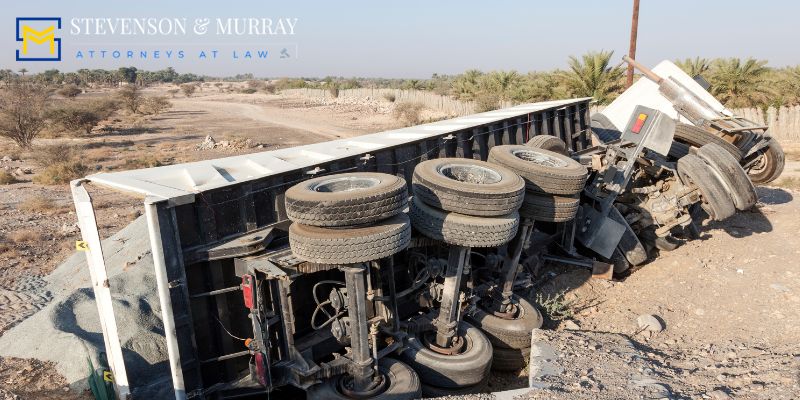Galveston Truck Accident Lawyer
Galveston Truck Accident Attorney

Every day, we are safely driven by tractor-trailers, semi-trucks, and other commercial trucks. But when accidents do happen due to the sheer size and weight of these vehicles, they can result in severe consequences. It then becomes crucial for those affected to understand the circumstances leading to the accident, identify who is responsible, and choose an experienced Galveston truck accident lawyer to defend them.
At Stevenson & Murray, our seasoned team of Galveston truck accident attorneys has successfully assisted numerous clients in recovering from the aftermath of commercial truck accidents. Our team will meticulously assess the specifics of your recent accident and guide you in identifying the most effective legal recourse available.
Common Causes of Truck Accidents in Texas
Texas has a high volume of commercial truck traffic due to its diverse, robust economy and as a major gateway for international trade. Due to this, there are many common causes of truck accidents in Texas, including:
- Driver Fatigue: Long hours on the road can lead to driver fatigue, impairing attention and reaction times. Despite regulations limiting driving hours, some truckers may push themselves to meet tight schedules.
- Speeding: Excessive speed, whether due to aggressive driving or trying to meet tight delivery deadlines, is a common cause of truck accidents. Speeding reduces a driver’s ability to react quickly to unexpected situations.
- Equipment Failures due to Negligence: Neglecting proper maintenance and pre-trip inspections can lead to equipment failures, such as brake malfunctions or tire blowouts, which can contribute to accidents.
Other common causes of truck accidents include impaired or aggressive driving, inadequate training, failure to adhere to traffic laws, improper lane changes and turns, failure to check blind spots, and overloaded or improperly loaded trucks.
Proving Liability is Essential
If you suspect that another party’s negligence led to your recent truck accident, you are required to demonstrate that they breached a duty of care specific to the situation, directly leading to your damages. You might also need to establish that their actions were intentionally harmful, displaying a clear disregard for the safety of others or willfully violating Texas law in some manner.
Following a truck accident, a comprehensive investigation involving law enforcement, insurance adjusters, and your attorney is conducted to establish liability through evidence gathered from the collision. Evidence that can be crucial for proving liability can be:
- Police reports
- Photographs and videos of the accident scene
- Witness statements
- Black box data that records the truck’s speed, braking, and other critical factors leading up to the accident
- Driver logs
- Maintenance and inspection records
- Employment records
- Trucking company policies
- Cell phone records
- Accident reconstruction
- Social media and communication records
- Medical records
- Expert testimony
The key element to receiving compensation after a truck accident is proving the liable party committed negligence. In order to prove negligence, it must be proven that the liable party did or did not do something that caused the truck accident, that the negligence resulted in the accident, and that damages were suffered. You must also demonstrate what the damages are, which may encompass medical expenses, lost wages, or a permanent loss of function in a specific part of the body.
Every truck accident case is unique, and it is crucial to work with an attorney who can effectively navigate the variables of your case. It is very unlikely that you will receive all that you are owed without the support of an experienced truck accident attorney.
Who Can Be Liable For A Truck Accident Injury
Texas follows a modified comparative fault system, also known as proportionate responsibility. This means that each party involved in an accident may be assigned a percentage of fault. Parties that may be liable include the truck driver, the truck company, the truck manufacturer, or a third party such as other drivers, government entities responsible for road maintenance, or any contractors.
In a truck accident where multiple defendants share fault, each party is assigned a fault percentage corresponding to their level of liability. These fault percentages can be determined through private settlement negotiations among the parties, or if the case goes to litigation, a judge may assign them.
If the injured party is deemed partially responsible for the damages they are seeking in a civil action, they forfeit a portion of their case award equivalent to their percentage of fault. In order to recover any damages, an injured party must be found to be 50% or less at fault.
Common Injuries in Truck Accidents
Truck accidents can result in a wide range of injuries due to the size and weight disparity between trucks and other vehicles. Commonly reported injuries include whiplash, back injuries, head injuries, fractures and broken bones, internal injuries, spinal cord injuries, cuts and lacerations, soft tissue injuries, burns, and psychological trauma.
It’s important to seek immediate medical attention after a truck accident, even if injuries may not be immediately apparent. Prompt medical care is crucial for both immediate treatment and establishing a record of injuries for potential legal claims.
Damages That Can be Recovered
In a truck accident case in Galveston, Texas, various types of damages may be recoverable, depending on the circumstances of the accident and the injuries sustained. These damages can be broadly categorized into economic and non-economic damages.
Economic damages can be medical expenses for past and future medical bills, lost wages, and property damage and losses that insurance will not cover. This can also include loss of future earning potential if the injuries are severe enough that they cannot return to work or only for a limited time.
Non-economic damages include pain and suffering, loss of enjoyment of life, and disfigurement or scarring. In certain cases where the liable party’s conduct is deemed especially reckless or egregious, punitive damages may be considered. These damages are intended to punish them and discourage similar behavior in the future.
In Texas, the multiplier method is a common approach used to calculate pain and suffering damages in personal injury cases. The multiplier method involves multiplying the economic damages by a certain factor, typically between 1.5 and 5, to determine the appropriate amount for pain and suffering. The specific multiplier is determined based on the severity of the injuries, impact on daily life, duration of recovery, and quality of life changes.
Importance of Hiring a Galveston Truck Accident Attorney
Hiring a Galveston truck accident attorney brings legal experience to your side and can help you navigate the complexities of truck accident cases and build a strong case. While you focus on recovery, Stevenson & Murray can advocate for your fair compensation and protect your rights throughout the legal process.
FAQs
Q: How Much Are Most Truck Accident Settlements?
A: The amount of compensation in a truck settlement will differ for each case. Medical expenses, lost wages, pain and suffering, property damage, and other relevant factors influence the outcome of a truck accident settlement. Additionally, liability and the degree of negligence involved can significantly impact the settlement amount.
Q: Can You Sue a Trucking Company in Texas After an Accident?
A: Yes, you can sue a trucking company in Texas after an accident if you believe their negligence or the negligence of their employee –the truck driver– contributed to the accident and your resulting injuries or damages. Trucking accidents can be complex, often involving multiple parties, such as the truck driver, the trucking company, and possibly others like maintenance contractors or manufacturers.
Q: How Long Do I Have to File a Lawsuit After a Truck Accident in Texas?
A: In Galveston, TX, the statute of limitations for personal injury claims, including truck accidents, is generally two years from the date of the accident. It’s crucial to be aware of and adhere to the statute of limitations. Initiating legal proceedings sooner rather than later can also be beneficial as evidence may be more readily available, and the details of the accident are likely to be fresher in the minds of witnesses.
Q: Can I Still Sue if I Was Partially at Fault for the Truck Accident in Texas?
A: Yes, you can still sue for damages after a truck accident in Texas, even if you were partially at fault. Texas follows a modified comparative fault system, also known as proportionate responsibility. According to this system, you can pursue a legal claim as long as your level of fault is less than 51%. However, the amount of compensation you receive may be reduced based on your percentage of fault.
Q: Should I Hire a Lawyer for a Minor Car Accident in Texas?
A: Whether or not you choose to hire a lawyer for a minor car accident in Texas depends on the extent of your injuries, disputed liability, insurance challenges, losses beyond property damage, and any other complex circumstances. While some minor accidents can be resolved without legal representation, consulting with an attorney can provide you with a clearer understanding of your rights and options.
Contact Our Galveston Truck Accident Lawyers Today
In the aftermath of a truck accident, having a truck accident lawyer is crucial to navigating the complexities of your case and ensuring that justice is served. Our dedicated team at Stevenson & Murray is here to protect your rights and hold negligent parties accountable for their actions. We understand the physical, emotional, and financial toll such incidents can take on you and your loved ones. Contact us today online to schedule a consultation.

Get Help Today
Request a Free Consultation
"*" indicates required fields

